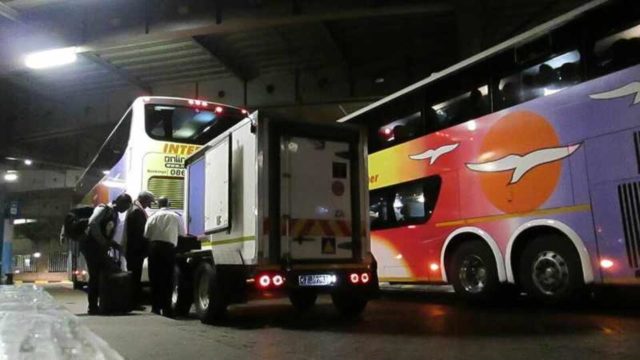The long-distance coach industry has raised its concerns about the failure of the Department of Transport to address the life-threatening violence affecting it. Industry leader Intercape has slammed Transport Minister Fikile Mbalula for his lack of awareness about ‘endemic acts of violence and intimidation’ in the sector.
THE LONG-distance coach industry has raised its concerns about the failure of the Department of Transport to address the life-threatening violence affecting it.
Industry leader Intercape slammed Transport Minister Fikile Mbalula for his lack of awareness about endemic acts of violence and intimidation in the sector.
In papers filed with the high court in Makhanda in the Eastern Cape on Friday, Intercape pointed to Mbalula’s “ongoing disregard for the seriousness of the issues at hand, which concern life-threatening and endemic acts of violence and intimidation”.
“This was contained in an affidavit by Intercape CEO Johann Ferreira in response to an earlier court order that the Minister of Transport and the MEC for Transport in the Eastern Cape work with police to come up with a plan of action to secure the safety of Intercape coaches, passengers, and employees,” said an Intercape statement.
Intercape further said that there had been about 150 recorded violent incidents – including shootings, stonings, and acts of intimidation – directed at Intercape and other long-distance operators by rogue taxi associations intent on forcing long-distance coach companies out of operating in certain regions and routes across South Africa.
The statement highlighted that the Eastern Cape was the epicentre of this campaign of violence.
The company said that in September Intercape had approached the high court seeking an order to compel the government to “take positive steps to ensure that reasonable and effective measures are in place to provide for the safety and security of long-distance bus drivers and passengers in the Eastern Cape”.
“The court found in Intercape’s favour and gave the Minister and MEC 20 days to formulate a workable plan of action – this as the company is gearing up for the busy festive season when inter-provincial travel peaks.
“The MEC filed an action plan on 28 October. However, on the same day, Minister Mbalula gave notice of his intention to apply for leave to appeal the court order,” added the statement.
The statement went further to say that, in his responding affidavit filed on Friday, Ferreira said of the minister’s response: “It was this very dereliction of duty which required Intercape to institute these proceedings in the first place.
“Circumstances which rendered the matter urgent when it was launched persist to this day,” Ferreira added.
Ferreira argued that, notwithstanding the minister’s appeal, it was imperative that the crisis in the Eastern Cape be addressed without delay.
According to Intercape, to date, and with the festive season approaching, Intercape remains unable to operate in these no-go zones.
“The action plan’s failure to mention the no-go zones, let alone provide a single initiative to address them, means that it has failed to grapple with one of the main problems facing Intercape’s buses – that they are subjected to acts of vigilantism in the no-go zones,” said Intercape.
Intercape further argued that the minister and the MEC had not considered exercising certain powers, such as those envisioned under section 91 of the National Land Transport Act, which permits the use of “any extraordinary measures” such as the closure of taxi ranks or routes, or the suspension of operating permits.
“It is Intercape’s submission that the exercise of the MEC’s section 91 powers is, at the very least, required to open up the no-go zones in which Intercape is unable to operate. As matters presently stand, those directly or indirectly responsible for the acts of intimidation and violence are permitted to operate in these areas, while those who are subjected to such acts of intimidation and violence are not. That is plainly untenable,“ added the statement.
Intercape has asked the MEC to prepare a revised action plan that takes into account Intercape’s inputs and present it for further consideration.








